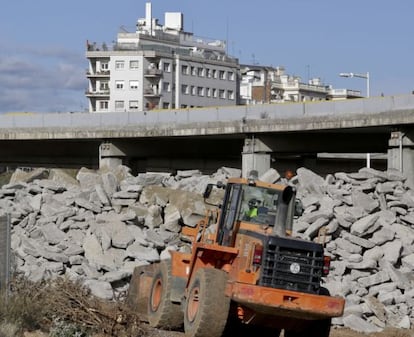Spanish demolition company looking to make rubble overseas
Control Demeter is aiming to leave the domestic crisis behind it

"When the economy picks up, we're the first to know it, because we're the first to get work," says Manuel Algueró, the founder of the family-owned Spanish demolition business Control Demeter.
In 2009, the company had revenues of 8.6 million euros, which fell to 1.5 million by 2011 as the economic crisis in Spain tightened its grip. For 2013, with a workforce slimmed down by a third and lower wages for the 40 employees that remain on its books, it estimates turnover of 3.1 million euros. For this year, it is aiming to take in some six million euros, and already has an order book for 80 percent of that figure.
Some work is coming in from construction and real estate companies, while banks, which have acquired old buildings and industrial warehouses as a result of foreclosures, are also starting to appear on the horizon. And despite the ongoing austerity drive, public administrations, which traditionally account for about 60 percent of Control Demeter's business, are putting orders in for demolition work. Barcelona City Hall has contracted Algueró's company to level the road conjunction in Glorias square as part of an urban facelift for the Catalan capital. Control Demeter was also involved in the historic demolition of soccer club Espanyol's old Sarrià stadium in 1997.
But according to Algueró, Control Demeter's real future lies outside of Spain. "If we don't look abroad things are going to get very difficult for us," he says. After some of its workers helped in the clear up about 1,000 buildings hit by the earthquake that shook the area around the Marmara Sea in Turkey in 1999, the company decided to specialize in emergency operations and put increasing emphasis on overseas business, which it is hoping will account for about half of its revenues within two to three years.
n Europe, everything has been done, while in Latin America everything remains to be done"
Control Demeter is also looking to work in Haiti on the expansion project for Port-au-Prince's harbor, which will use the rubble from the earthquake there in 2010. It is also hoping to secure contracts in Buenos Aires and Montevideo. "In Europe, everything has been done, while in Latin America everything remains to be done," says Algueró, who points to the experience Control Demeter acquired in preparations for the Olympic Games in Barcelona in 1992 in waste management. It has presented its waste management model to the municipal governments of Wenzhou and Rizhao in China.
The problem with overseas contracts is one of timing. Control Demeter has been waiting to take part in the demolition of Turkish soccer club Galatasaray's stadium in Istanbul but the project has been frozen, hence the need to still rely on Spain as the company's main market, even more so now that the crisis has wiped out a number of rivals in the sector.
Specialized demolitions firms in Spain have also found a potential new client in Sareb, the asset management corporation, or so-called bad bank, set up by the government to absorb the toxic real estate assets of banks that came unstuck during the crisis. The Sareb may decide that the best solution for the huge stock of unfinished housing it has acquired is demolition.
Control Demeter has had no contact with the Sareb, but has dealt with the banks, receiving contracts from them to knock down eight buildings and industrial warehouses they held in the Barcelona area.
Tu suscripción se está usando en otro dispositivo
¿Quieres añadir otro usuario a tu suscripción?
Si continúas leyendo en este dispositivo, no se podrá leer en el otro.
FlechaTu suscripción se está usando en otro dispositivo y solo puedes acceder a EL PAÍS desde un dispositivo a la vez.
Si quieres compartir tu cuenta, cambia tu suscripción a la modalidad Premium, así podrás añadir otro usuario. Cada uno accederá con su propia cuenta de email, lo que os permitirá personalizar vuestra experiencia en EL PAÍS.
¿Tienes una suscripción de empresa? Accede aquí para contratar más cuentas.
En el caso de no saber quién está usando tu cuenta, te recomendamos cambiar tu contraseña aquí.
Si decides continuar compartiendo tu cuenta, este mensaje se mostrará en tu dispositivo y en el de la otra persona que está usando tu cuenta de forma indefinida, afectando a tu experiencia de lectura. Puedes consultar aquí los términos y condiciones de la suscripción digital.









































